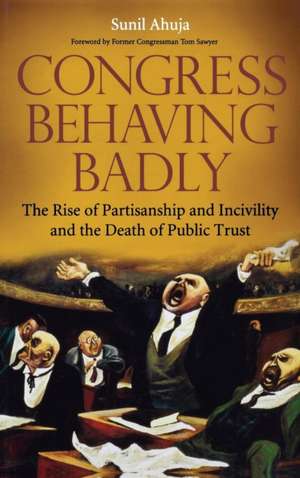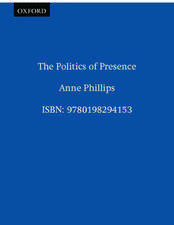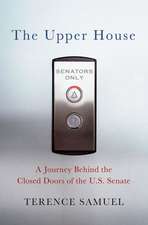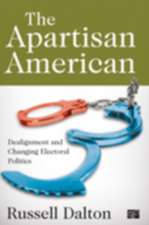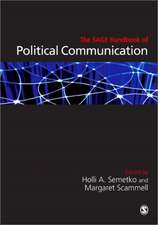Congress Behaving Badly: The Rise of Partisanship and Incivility and the Death of Public Trust
Autor Sunil Ahujaen Limba Engleză Hardback – 29 mar 2008 – vârsta până la 17 ani
Preț: 363.73 lei
Preț vechi: 478.87 lei
-24% Nou
Puncte Express: 546
Preț estimativ în valută:
69.60€ • 72.67$ • 57.60£
69.60€ • 72.67$ • 57.60£
Carte tipărită la comandă
Livrare economică 04-18 aprilie
Preluare comenzi: 021 569.72.76
Specificații
ISBN-13: 9780275998684
ISBN-10: 0275998681
Pagini: 192
Dimensiuni: 156 x 235 x 20 mm
Greutate: 0.44 kg
Editura: Bloomsbury Publishing
Colecția Praeger
Locul publicării:New York, United States
ISBN-10: 0275998681
Pagini: 192
Dimensiuni: 156 x 235 x 20 mm
Greutate: 0.44 kg
Editura: Bloomsbury Publishing
Colecția Praeger
Locul publicării:New York, United States
Notă biografică
SUNIL AHUJA is Associate Professor of Political Science at Youngstown State University. He is Editor of the recurrent series The Roads to Congress, coeditor of Legislative Studies Quarterly, and Past President of the Northeastern Political Science Association.
Cuprins
About the AuthorPrefaceChapter 1 The Problem of Incivility and PartisanshipChapter 2 The Capitol Hill Junior High SchoolChapter 3 Changing of the GuardChapter 4 Whats Behind Partisanship and Uncivil Debate in Congress?Chapter 5 Whither Confidence and Respect in the Modern Congress?Chapter 6 The Impact of Partisanship and Incivility on the Legislative ProcessChapter 7 Democracy is a ConversationIndex
Recenzii
Ahuja (Youngstown State Univ.) explores the rise of partisanship and incivility in the two houses of the US Congress..The book provides a doleful record of bad behavior. Recommended.
Ahuja..reviews the extensive literature, considers the evidence demonstrating Congress's poor performance and incivility, and offers six causes..The author provides ample quantitative and qualitative evidence that documents the factors discussed, and he concludes with a series of recommendations to improve the institution..This is a concise and informative book, and a valuable addition for all libraries whose holdings in this subject area are limited.
A plain-spoken examination of a serious problem in American representative democracy, highly recommended - especially for anyone serving or considering serving in a public office.
Ahuja..reviews the extensive literature, considers the evidence demonstrating Congress's poor performance and incivility, and offers six causes..The author provides ample quantitative and qualitative evidence that documents the factors discussed, and he concludes with a series of recommendations to improve the institution..This is a concise and informative book, and a valuable addition for all libraries whose holdings in this subject area are limited.
A plain-spoken examination of a serious problem in American representative democracy, highly recommended - especially for anyone serving or considering serving in a public office.
